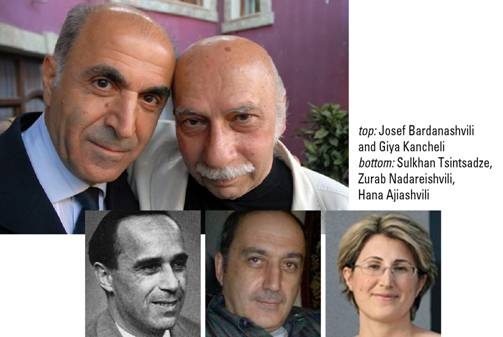
Continuum, now in its 44th season under the direction of founders Cheryl Seltzer and Joel Sachs, appears to be more vital than ever. A recent program focusing on new works by composers from the Republic of Georgia underscored this impression. We heard four U.S Premieres and a World Premiere by composers we might otherwise encounter only in piecemeal fashion, if at all (with Giya Kancheli being the possible exception), all tied together in memorable and meaningful ways, including informative notes and the opportunity to hear two of the composers speak. Incidentally the only work that was not a premiere was Kancheli’s Psalm 23 from “Exile,” a work that Continuum premiered in the 1990’s.
The program opened with Four Quartet Miniatures (1947-1978) by Sulkhan Tsintsadze (1925-1991), the only deceased composer of the five presented. Including “Lale” (1947), “Shepherd’s Dance” (1951), “Didavoi Nana” (1978) and “Khorumi” (1978), the folk-like string quartet selections reminded one of Bartok, but with a lyricism that is perhaps uniquely Georgian. They established beautifully the “roots” of the Georgian program, and Renée Jolles, Airi Yoshioka, Stephanie Griffin, and Kristina Reiko Cooper played with both polish and affection.
Ms. Griffin returned to the stage to play “Cadenza” (2007), a study in duality for solo viola by Zurab Nadareishvili (b.1957). The work juxtaposes shades of Berg’s “Wozzeck” in the upper register against an earthy folk bass, sometimes in rapid alternation – quite a tour de force. Griffin was more than up to the challenges, technically and emotionally.
Psalm 23 from “Exile” (1994) by Giya Kancheli (b. 1935) closed the first half with expanded forces including Mary Mackenzie (soprano), Ulla Suokko (flute), and Paul Sharp (double bass), along with Griffin, Cooper, Seltzer (synthesizer and tape), and Sachs conducting. A haunting setting of the famous Biblical text “The Lord is my shepherd”, it uses tonality in what the program notes aptly describe as “a fresh expression of timeless values.” Otherworldly combinations of taped and live music created a mystical feeling, such that one hardly paid attention to the fine playing of individual performers, who served the music as one.
Josef Bardanashvili (b. 1948), who had traveled from Israel to hear his pieces and speak after intermission, was as exuberant in his speaking personality as he emerged in his music. His “Sola” for guitar (2006), a fascinating work, ran the gamut from Bachian beginnings to a range of contemporary outpourings that never felt incongruous within the improvisatory flow of it all. Oren Fader was the excellent guitarist. Hana Ajiashvili, the other composer who had flown in from Israel, suggested connections between Georgian improvisation and polyphony and her own music (with its indeterminate elements and complex textures), but reflected an international style in “My God, the Soul You Placed Within Me” (2007). Perhaps the thorniest work of the evening, it employed difficult atonal writing and strident clusters suggesting the texts of three very dark poems by Yehuda Amichai. The effect, captured well by Mackenzie, Jolles, Bryant, Seltzer, and clarinetist Moran Katz, was wildly expressive.
The evening closed with one more work by Bardanashvili, the World Premiere of his “Farewell Song – In Memory of My Parents” (2008) for solo clarinet (Katz, playing the part written for Giora Feidman) and solo cello (Cooper), with strings conducted by Joel Sachs. Ms. Katz, a force of nature (who also translated from Hebrew for Mr. Bardanashvili), played three clarinets brilliantly: standard, piccolo, and bass clarinets. Her dynamic and timbral ranges, complemented wonderfully by Ms. Cooper’s luscious cello sound, brought intense expressivity to this profoundly sad work. All in all, it was an enlightening evening that whetted the appetite to know more Georgian music.
